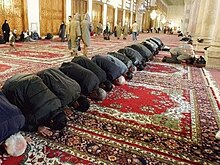Sujud Tilawa
| Part of a series on |
| Islam |
|---|
 |
The prostration of recitation (
Presentation
Defining the prostration of recitation (tilawa) as a movement of prostration resulting from the reason that it is a duty (wajeeb) or a mustahabb when the recitation reaches one of the verses of prostration.[3][4]
This Sujud occurs during the Tilawa recitation of the
Muslim jurists agree on the legitimacy of the prostration of recitation but differ on whether it was a duty.[6][7]
There are fifteen places where
Religious legality
And they based their opinion on
English: Say, ‘Whether you believe in it, or do not believe in it, indeed those who were given knowledge before it when it is recited to them, fall down in prostration on their faces.
(Quran: 17:107)
A prophetic
| Arabic hadith | English translation |
|---|---|
|
|
Another hadith was also narrated by the companion Abdullah ibn Umar in which he said:[12]
| Arabic hadith | English translation |
|---|---|
|
|
Shafi'i and Hanbali jurists do not consider the prostration of recitation as a duty for them, relying on the fact that Muhammad left it when he recited Surah An-Najm which included a verse of prostration, and he did not prostrate in it.[13]
This was confirmed by the hadith that was narrated by the companion Zayd ibn Thabit, may God Almighty be pleased with him, in which he said:[14]
| Arabic hadith | English translation |
|---|---|
|
|
Conditions

The Muslim jurists stated that the prostration of Quran recitation is required the same conditions as for
Few jurists also stated that a Muslim who had lost his two purity, meaning ghusl and wudu, should not prostrate in Quran recitation.[17][18]
If the
In order for the prostration of recitation to be valid, the time for prostration must begin, and this happens according to the majority of jurists by reading or hearing all of the verse of the prostration; If the reciter (
The validity of the prostration of recitation requires that the entire verse of prostration be heard, it is not sufficient for the one who is prostrating to hear only the word of prostration on its own.[23][24]
The listener who wants to prostrate is also required to refrain from corrupting things such as eating, speech and actions that are outside of reverence.[25][26]
Supplication
Imam Al-Ghazali said that the one who is prostrating in recitation must make supplication (dua) in his prostration in a manner befitting the context and meaning of the verse of prostration he read, and it is also permissible for him to utter tasbih and various dua.[27][28]
Imam
| Arabic hadith | English translation |
|---|---|
|
|
Fiqh opinions on prostration verses

In
This is because Imam
And their argument for negating the four prostrations in the
It was reported on the authority of
And
Verses of prostration

The
1. ۩
2. ۩
3. ۩
4. ۩
5. ۩
6. ۩
7. ۩
8. ۩
9. ۩
10. ۩
11. ۩
).The four remaining Sajadates to close the number of fifteen are located in the Surates of the Mufassal going from Surah Qaf to Surah Al-Nas:[41][42]
12. ۩
13. ۩
14. ۩
15. ۩
In most
Muslims must prostrate once in order to follow the Sunnah (example) of Muhammad and recite any one or more of the following along with Takbir before and after the Sujud.[44]
Gallery
See also
References
- ^ Islamkotob. "الموسوعة الفقهية - ج 24 - زلزلة - سرية".
- ISBN 9781847740540.
- ^ "تيسير الوصول إلى جامع الأصول من حديث الرسول (ص) 1-4 ج3". January 2012.
- ISBN 9782745184962.
- ^ جبرين, عبد الله بن. "فتاوي في سجود التلاوة".
- ISBN 9782745187550.
- ISBN 9782745180957.
- ISBN 9782745135933.
- ISBN 9782745139757.
- ^ "The Quran".
- ^ "تأويلات أهل السنة - تفسير الماتريدي 1-10 ج5". January 2005.
- ^ "يسألونك عن صلاة الجمعة". January 2015.
- ^ "المجموع شرح المهذب 1-27 ج5". January 2011.
- ^ "جامع المتون العلمية". 29 January 2020.
- ^ السبكي, محمود خطاب (January 2007). "الدين الخالص أو إرشاد الخلق إلى دين الحق 1-4 ج3".
- ^ "المجموع شرح المهذب 1-27 ج5". January 2011.
- ISBN 9782745189080.
- ^ "الصيام في الاسلام في ضوء الكتاب و السنة".
- ^ "الخشوع في الصلاة في ضوء الكتاب والسنة".
- ISBN 9782745179388.
- ISBN 9782745154835.
- ISBN 9782745103567.
- ^ "عجالة المحتاج إلى توجيه المنهاج 1-4 ج1". January 2008.
- ISBN 9782745126771.
- ISBN 9782745110794.
- ^ "عمدة الرعاية على شرح الوقاية 1-7 ج2". January 2016.
- ISBN 9782745107701.
- ISBN 9789960208329.
- ISBN 9782745136367.
- ^ Fikr, dar el; السهارنفوري; Islamicbooks (27 October 2015). "بذل المجهود جزء رابع 17*24 Bazel el Majhud V4 1C".
- ^ "كتاب السنن الكبرى - الجزء الأول".
- ^ "شرح بلوغ المرام من أدلة الأحكام 1-6 ج2". January 2008.
- ^ "الغرر البهية في شرح منظومة البهجة الوردية 1-11 مع الفهارس ج2". January 1997.
- ^ "لمعات التنقيح في شرح مشكاة المصابيح للخطيب التبريزي 1-11 ج3". January 2020.
- ISBN 9782745101723.
- ^ "مرقاة المفاتيح شرح مشكاة المصابيح للإمام محمد التبريزي 1-11 ج3". January 2015.
- ^ "الذخيرة البرهانية المسمى (ذخيرة الفتاوى في الفقه على المذهب الحنفي) 1-15 ج7". January 2019.
- ISBN 9782745179029.
- ISBN 9782745179029.
- ISBN 9789957600990.
- ^ "شرح فتح القدير على الهداية شرح بداية المبتدي 1-10 ج2". January 2017.
- ISBN 9782745181404.
- ^ "المغني على مختصر الخرقي ومعه الشرح الكبير على متن المقنع 1-15 ج14". January 2009.
- ^ "إرشاد الساري لشرح صحيح البخاري 1-15 ج3". January 2016.



